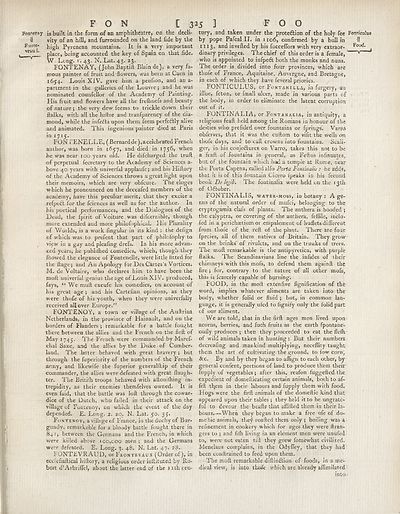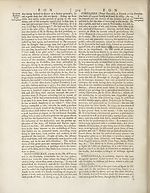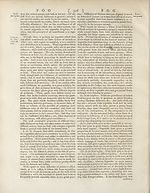Encyclopaedia Britannica > Volume 7, ETM-GOA
(353) Page 325
Download files
Complete book:
Individual page:
Thumbnail gallery: Grid view | List view

F O N C 325 J F O O
PonTPsy is built in the form of an amphitheatre, on the decli-
tl vity of an hill, and furrounded on the land fide by the
Fonte- hjgh J>yrenean mountains. It is a very important
. vrau ' place, being accounted the key of Spain on that fide.
W Long. 1.43. N. Lat. 43. 23.
FONTENAY, (John Baptifi Blainde), a very fa¬
mous painter of fruit and flowers, was born at Caen in
1654. Louis XIV. gave him a penfion, and an a-
partment in the galleries of the Louvre ; and he was
nominated counfellor of the Academy of Painting.
His fruit and flowers have all the freftmefs and beauty
of nature ; the very dew feems to trickle down their
ftalks, with all the luftre and tranfparency of the dia¬
mond, while the infedts upon them feem perfeftly alive
and animated. This ingenious painter died at Paris
in 1715.
FON FENELLE, ( Bernard de ), a celebrated French
author, was born in 1657, and died in 1756, when
he was near xoo years old. He difcharged the trull
of perpetual fecretary to the Academy of Sciences a-
bove 40 years with univerfal applaufe; and his Hiltory
of the Academy of Sciences throws a great light upon
their memoirs, which are very obfcure. The eloges
which he pronounced on the deceafed members of the
academy, have this peculiar merit, that they excite a
refpedl for the fciences as well as for the author. In
his poetical performances, and the Dialogues of the
Dead, the fpirit of Voiture was difcernible, though
move extended and more philofophical. His Plurality
of Worlds, is a work lingular in its kind : the defign
of which was to prefent that part of philofophy to
view in a gay and pleafing drcfs. In his more advan¬
ced years, he publilhed comedies, which, though they
Ihowed the elegance of Fontenelle, were little fitted for
the ftage; and An Apology for Des Cartes’s Vortices.
M. de Voltaire, who declares him to have been the
molt univerfal genius the age of Louis XIV. produced,
fays, “ We mull excufe his comedies, on account of
his great age ; and his Cartefian opinions, as they
were thofe of his youth, when they were univerfaliy
received all over Europe.”
FONTENOY, a town or village of the Auftrian
Netherlands, in the province of Hainault, and on the
borders of Flanders ; remarkable for a battle fought
there between the allies and the French on the firft of
May 1745. The French were commanded by Maref-
chal Saxe, and the allies by the Duke of Cumber¬
land. The latter behaved with great bravery; but
through the fuperiority of the numbers of the French
army, and likewife the fuperior generahhip of their
commander, the allies were defeated with great {laugh¬
ter. The Britifh troops behaved with altonidling in¬
trepidity, as their enemies themfelves owned. It is
even faid, that the battle was loll through the cowar¬
dice of the Dutch, who failed in their attack on the
village of Fontenoy, on which the event of the day
depended. E. Long. 2. 20. N. Lat. 50. 35.
Fontesoy, a village of France, in the duchy of Bur¬
gundy, remarkable for a bloody battle fought there in
841, between the Germans and the French, in which
were killed above 100,000 men ; and the Germans
were defeated. E. Long. 3. 48. N. Lat. 47. 28.
FONTEVRAUD, or Frontevaux (Order of), in
ecdefiallical hiftory, a religious order inllituted by Ro¬
bert d’Arbriffel, about the latter end of the 1 nh cen¬
tury, and taken under the prote&ion of the holy fee Fonticului
by pope Pafcal II. in 1106, confirmed by a bull in II
1113, and in veiled by his fucceflbrs with very extraor- Foix^ c
dinary privileges. The chief of this order is a female, ^
who is appointed to infpeA both the monks and nuns.
The order is divided into four provinces, which are
thofe of France, Aquitaine, Auvergne, and Bretagne,
in each of which they have feveral priories.
FONTICULUS, or Fontanella, in furgery, an
iflue, feton, or fmall ulcer, made in various parts of
the body, in order to eliminate the latent corruption
out of it.
FONTINALIA, or Fontanalia, in antiquity, a
religious feaft held among the Romans in honour of the
deities who prefided over fountains or fprings. Varnt
obferves, that it was the cuftom to viiit the wells on
thofe days, and to call crowns into fountains. Scaii-
ger, in his conjeclures on Varro, takes this not to be
a feaft of fountains in general, as Feftus infinuates,
but of the fountain which had a temple at Rome, near
the Porta Capena, called alfo Porta Fontinalu : he adds,
that it is of this fountain Cicero ipeaks in his fecond
book De leg'll. The fontinalia were held on the 13th
of Oilober.
FONTINALIS, water-moss, in botany : A ge¬
nus of the natural order of mufci, belonging to the
cryptogamia clafs of plants. The anthera is hooded ;
the calyptra, or covering of the anthera, fefiile, inclo-
fed in a perichaetium or empalement of leaflets different
from thofe of the rell of the plant. There are four
fpecies, all of them natives of Britain. They grow
on the brinks of rivulets, and on the trunks of trees.
The moll remarkable is the antipyretica, with purple
ftalks. The Scandinavians line the infides of iheir
chimneys with this mofs, to defend them againft the
fire ; for, contrary to the nature of all other mofs,
this is fcarcely capable of burning.
FOOD, in the moll extenfive fignification of the
word, implies whatever aliments are taken into the
body, whether folid or fluid ; but, in common lan¬
guage, it is generally tiled to lignify only the folid part
of our aliment.
We are told, that in the firft; ages men lived upon
acorns, berries, and fuch fruits as the earth fpontane-
oufly produces ; then they proceeded to eat the flelh
of wild animals taken in hunting: But their numbere
decreafing and mankind multiplying, neceflity taught
them the art of cultivating the ground, to (ow corn,
&c. By and by they began to aflign to each other, by
general confent, portions of land to produce them their
fnpply of vegetables; after this, reafon fuggefted the
expedient of domefticating certain animals, both to af-
fill tl\em in their labours and fupply them with food.
Hogs were the firft; animals of the domeftic kind that
appeared upon their tables ; they held it to be ungrate¬
ful to devour the beafts that afiifted them in their la¬
bours.—When they began to make a free ufe of do¬
mestic animals, they roafted them only ; boiling was a
refinement in cookery which for ages they were ftran-
gers to ; and fifh living in an element men were unufed
to, were not eaten tiil they grew lomewhat civilized.
Menelaus complains, in the Odyfi'ey, that they had
been conftrained to feed upon them.
The moil remarkable diflinfLion of foods, in a me¬
dical view, is into tbofe which are already afiimilated
into
PonTPsy is built in the form of an amphitheatre, on the decli-
tl vity of an hill, and furrounded on the land fide by the
Fonte- hjgh J>yrenean mountains. It is a very important
. vrau ' place, being accounted the key of Spain on that fide.
W Long. 1.43. N. Lat. 43. 23.
FONTENAY, (John Baptifi Blainde), a very fa¬
mous painter of fruit and flowers, was born at Caen in
1654. Louis XIV. gave him a penfion, and an a-
partment in the galleries of the Louvre ; and he was
nominated counfellor of the Academy of Painting.
His fruit and flowers have all the freftmefs and beauty
of nature ; the very dew feems to trickle down their
ftalks, with all the luftre and tranfparency of the dia¬
mond, while the infedts upon them feem perfeftly alive
and animated. This ingenious painter died at Paris
in 1715.
FON FENELLE, ( Bernard de ), a celebrated French
author, was born in 1657, and died in 1756, when
he was near xoo years old. He difcharged the trull
of perpetual fecretary to the Academy of Sciences a-
bove 40 years with univerfal applaufe; and his Hiltory
of the Academy of Sciences throws a great light upon
their memoirs, which are very obfcure. The eloges
which he pronounced on the deceafed members of the
academy, have this peculiar merit, that they excite a
refpedl for the fciences as well as for the author. In
his poetical performances, and the Dialogues of the
Dead, the fpirit of Voiture was difcernible, though
move extended and more philofophical. His Plurality
of Worlds, is a work lingular in its kind : the defign
of which was to prefent that part of philofophy to
view in a gay and pleafing drcfs. In his more advan¬
ced years, he publilhed comedies, which, though they
Ihowed the elegance of Fontenelle, were little fitted for
the ftage; and An Apology for Des Cartes’s Vortices.
M. de Voltaire, who declares him to have been the
molt univerfal genius the age of Louis XIV. produced,
fays, “ We mull excufe his comedies, on account of
his great age ; and his Cartefian opinions, as they
were thofe of his youth, when they were univerfaliy
received all over Europe.”
FONTENOY, a town or village of the Auftrian
Netherlands, in the province of Hainault, and on the
borders of Flanders ; remarkable for a battle fought
there between the allies and the French on the firft of
May 1745. The French were commanded by Maref-
chal Saxe, and the allies by the Duke of Cumber¬
land. The latter behaved with great bravery; but
through the fuperiority of the numbers of the French
army, and likewife the fuperior generahhip of their
commander, the allies were defeated with great {laugh¬
ter. The Britifh troops behaved with altonidling in¬
trepidity, as their enemies themfelves owned. It is
even faid, that the battle was loll through the cowar¬
dice of the Dutch, who failed in their attack on the
village of Fontenoy, on which the event of the day
depended. E. Long. 2. 20. N. Lat. 50. 35.
Fontesoy, a village of France, in the duchy of Bur¬
gundy, remarkable for a bloody battle fought there in
841, between the Germans and the French, in which
were killed above 100,000 men ; and the Germans
were defeated. E. Long. 3. 48. N. Lat. 47. 28.
FONTEVRAUD, or Frontevaux (Order of), in
ecdefiallical hiftory, a religious order inllituted by Ro¬
bert d’Arbriffel, about the latter end of the 1 nh cen¬
tury, and taken under the prote&ion of the holy fee Fonticului
by pope Pafcal II. in 1106, confirmed by a bull in II
1113, and in veiled by his fucceflbrs with very extraor- Foix^ c
dinary privileges. The chief of this order is a female, ^
who is appointed to infpeA both the monks and nuns.
The order is divided into four provinces, which are
thofe of France, Aquitaine, Auvergne, and Bretagne,
in each of which they have feveral priories.
FONTICULUS, or Fontanella, in furgery, an
iflue, feton, or fmall ulcer, made in various parts of
the body, in order to eliminate the latent corruption
out of it.
FONTINALIA, or Fontanalia, in antiquity, a
religious feaft held among the Romans in honour of the
deities who prefided over fountains or fprings. Varnt
obferves, that it was the cuftom to viiit the wells on
thofe days, and to call crowns into fountains. Scaii-
ger, in his conjeclures on Varro, takes this not to be
a feaft of fountains in general, as Feftus infinuates,
but of the fountain which had a temple at Rome, near
the Porta Capena, called alfo Porta Fontinalu : he adds,
that it is of this fountain Cicero ipeaks in his fecond
book De leg'll. The fontinalia were held on the 13th
of Oilober.
FONTINALIS, water-moss, in botany : A ge¬
nus of the natural order of mufci, belonging to the
cryptogamia clafs of plants. The anthera is hooded ;
the calyptra, or covering of the anthera, fefiile, inclo-
fed in a perichaetium or empalement of leaflets different
from thofe of the rell of the plant. There are four
fpecies, all of them natives of Britain. They grow
on the brinks of rivulets, and on the trunks of trees.
The moll remarkable is the antipyretica, with purple
ftalks. The Scandinavians line the infides of iheir
chimneys with this mofs, to defend them againft the
fire ; for, contrary to the nature of all other mofs,
this is fcarcely capable of burning.
FOOD, in the moll extenfive fignification of the
word, implies whatever aliments are taken into the
body, whether folid or fluid ; but, in common lan¬
guage, it is generally tiled to lignify only the folid part
of our aliment.
We are told, that in the firft; ages men lived upon
acorns, berries, and fuch fruits as the earth fpontane-
oufly produces ; then they proceeded to eat the flelh
of wild animals taken in hunting: But their numbere
decreafing and mankind multiplying, neceflity taught
them the art of cultivating the ground, to (ow corn,
&c. By and by they began to aflign to each other, by
general confent, portions of land to produce them their
fnpply of vegetables; after this, reafon fuggefted the
expedient of domefticating certain animals, both to af-
fill tl\em in their labours and fupply them with food.
Hogs were the firft; animals of the domeftic kind that
appeared upon their tables ; they held it to be ungrate¬
ful to devour the beafts that afiifted them in their la¬
bours.—When they began to make a free ufe of do¬
mestic animals, they roafted them only ; boiling was a
refinement in cookery which for ages they were ftran-
gers to ; and fifh living in an element men were unufed
to, were not eaten tiil they grew lomewhat civilized.
Menelaus complains, in the Odyfi'ey, that they had
been conftrained to feed upon them.
The moil remarkable diflinfLion of foods, in a me¬
dical view, is into tbofe which are already afiimilated
into
Set display mode to:
![]() Universal Viewer |
Universal Viewer | ![]() Mirador |
Large image | Transcription
Mirador |
Large image | Transcription
Images and transcriptions on this page, including medium image downloads, may be used under the Creative Commons Attribution 4.0 International Licence unless otherwise stated. ![]()
| Encyclopaedia Britannica > Encyclopaedia Britannica > Volume 7, ETM-GOA > (353) Page 325 |
|---|
| Permanent URL | https://digital.nls.uk/189125818 |
|---|
| Attribution and copyright: |
|
|---|
| Description | Ten editions of 'Encyclopaedia Britannica', issued from 1768-1903, in 231 volumes. Originally issued in 100 weekly parts (3 volumes) between 1768 and 1771 by publishers: Colin Macfarquhar and Andrew Bell (Edinburgh); editor: William Smellie: engraver: Andrew Bell. Expanded editions in the 19th century featured more volumes and contributions from leading experts in their fields. Managed and published in Edinburgh up to the 9th edition (25 volumes, from 1875-1889); the 10th edition (1902-1903) re-issued the 9th edition, with 11 supplementary volumes. |
|---|---|
| Additional NLS resources: |
|

